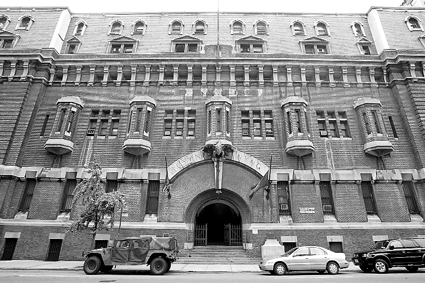By Albert Amateau
The city’s plan to use the 69th Regiment Armory on Lexington Avenue as a 24-hour, seven-day men’s homelessness-prevention and assessment center fell apart last week after a month-long opposition campaign by the 23rd Street Association and the Gramercy Block Association.
The armory occupies the block on the east side of Lexington Avenue between 25th and 26th Streets across from Baruch College and had been used as a shelter for homeless women.
James Anderson, a spokesperson for the Department of Homeless Services, said on Mon. Oct. 24, that the department intended to return homeless women, who had been relocated four months ago, to the 69th Regiment Armory.
On Mon. Oct. 17, the day before Community Boards 5 had scheduled a public hearing about the proposal for a men’s center with 120 beds, Community Board 5 received a letter from D.H.S saying the plan had been dropped because the state agency that runs the armory denied permission to modify the building for its new use.
Nevertheless, more than 400 Gramercy area residents turned up at the Epiphany Church on Second Avenue at 22nd Street on Oct. 18 for what turned out to be a celebration of community clout in stopping a project they feared would endanger the neighborhood.
“There was a lot of relief at the meeting,” said Timothy Cohen, program director of the 23rd Street Association. “Over the previous three weeks, we distributed more than 22,000 fliers to people on the 23rd Street Association and the Gramercy Block Association mailing lists,” Cohen said.
Despite an Oct. 12 letter from D.H.S. stating that the department had notified elected officials and community boards last May of its new armory plan, elected officials including Congressmember Carolyn Maloney, Councilmember Eva Moskowitz, Assemblymembers Richard Gottfried and Steve Sanders and State Senators Liz Krueger and Tom Duane, said in an Oct. 14 statement they never received any notice.
“We heard about it around Sept. 28 from neighborhood doormen who were friendly with armory building staff,” said Arlene Harrison, president of the Gramercy Block Association. “They said the women had been moved out in June and that D.H.S. was going to move the men’s assessment shelter from Bellevue to here,” she said.
In addition to the 120 beds for men who stay from three to 21 days during assessment, the armory was to have provided prevention services, including referring walk-in clients to drug counseling. Harrison said that based on the average annual intake of 11,733 men at Bellevue’s 400 East 30th Street shelter, there could be more than 20,000 visits per year at the armory.
Harrison also said that homeless ex-offenders, including level-3 sex offenders whose addresses must be listed, are among the Bellevue shelter residents. According to the state registry, 28 level-3 sex offenders were listed at the Bellevue shelter, but D.H.S. said that only three actually lived there, Harrison said.
“For us [defeating the proposal] was a public safety issue,” said Harrison. “This is a residential neighborhood, with Baruch College across the street, the School of Visual Arts nearby on 23rd Street and Madison Square Park, where mothers take their children, two blocks away.”
Sharon Ullman, president of the 23rd Street Association, said that opponents had invited D.H.S. personnel on Oct. 14 to attend the Community Board 5 Oct. 18 meeting at Epiphany Church. The department refused at first to send anyone to the meeting and then accepted if they could first meet with a select group of opponents the day before.
“We wrote back and said it wasn’t appropriate for a select group to have a private meeting the day before a community board public hearing and that whatever they could tell us on Monday ought to be disclosed to everyone on Tuesday,” Ullman said.
The proposal for a men’s homeless-assessment and prevention center was part of a plan to downsize the Bellevue shelter. Anderson, the D.H. S. spokesperson, was unable to say how the armory situation would affect the plan.



































